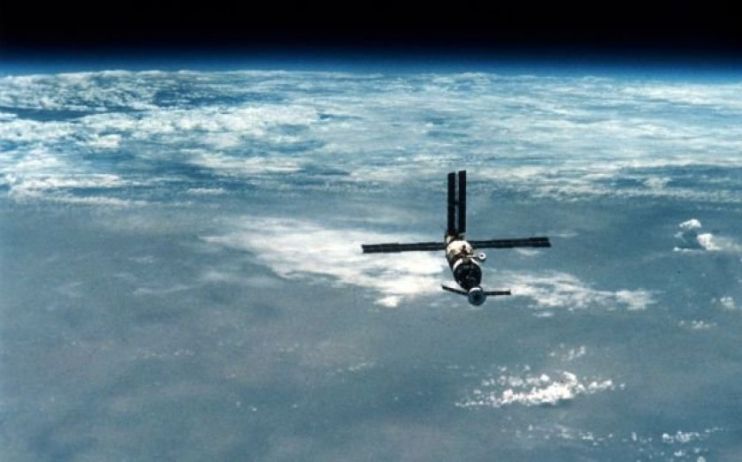Forget chlorinated chicken – put satellites ‘at the centre’ of a UK-US trade deal, says Raytheon UK space boss

Defence firm Raytheon has called for the space industry to be at the forefront of any future trade deal between the UK and the US, saying the sector can help the government fulfil its “levelling-up” agenda.
Speaking to City A.M., the firm’s UK managing director for space and cyber James Gray said that the sector should be “at the front and centre of any future trading relationship” between the two countries.
“Space is vital for the UK’s future prosperity, and as it grows in importance, having the opportunity to reach back to a country where the total investment has been so much greater than our own will be vital”, he added.
His comments came days after the government announced an extra £16.5bn in defence spending over the next four years.
Gray pointed to Raytheon’s Artemis project, which is seeking to develop the UK’s ability to launch satellites from British soil, as an example of the benefit of linking up with the US.
The company, a subsidiary of US giant Raytheon Technologies, has earmarked Newquay in Cornwall as the launch site for the project, which will use Virgin Orbit’s horizontal launch technology – a capability developed in the US.
“That’s the joy of joining up with the US”, Gray said. “The investment has already been made, and the technologies have been developed. We don’t have to spend the money again in the UK.”
But with the Good Friday agreement and issues around food standards likely to dominate the headlines surrounding any such trade deal, Gray was coy on what a Joe Biden presidency would mean for the sector.
“I don’t think the President-elect has set out his vision sufficiently yet. But if you look at prior administrations, space has always been on their mind, so I think we can be optimistic. For the meantime we’ll have to wait and see.”
Space can drive growth ‘all over the UK’
Gray was however adamant that such a deal could help Raytheon alleviate some of the issues lying heavy on the government in this country.
Developing a project such as Artemis in Cornwall, he said, would put the company “at the heart of the levelling-up agenda”, the government’s bid to balance out economic opportunity around the country.

The Newquay site will be a model of Raytheon’s existing base at Broughton in north Wales, which currently employs 280 people, as well as numerous others through the project’s supply chain.
And Gray added that the new focus on building back after the coronavirus pandemic “offers further opportunities to get away from pre-existing geographic constraints.
Before the Open newsletter: Start your day with the City View podcast and key market data
“Sectors like our own are hungry for high-quality jobs all over the UK – our industry can drive growth as we come back from this crisis.”
A number of other companies are also looking to deliver on this promise, with Lockheed Martin recently agreeing to switch its vertical satellite launch site to the Shetland Islands, where the UK’s new space centre will be located.
Currently, the space sector employs over 40,000 people in the UK, and underpins around £300bn in yearly economic activity, a new report from Athena, a consortium made up of Lockheed Martin, CGI, Serco, and Inmarsat has found.
An extra 120,000 jobs are also supported through the industry’s supply chain in the country, Gray added.
Spending announcement shows UK can ‘lead the world’
Last week’s spending announcement – the biggest surge in defence investment since the end of the Cold War – included eye-catching new investments into a new national cyber force, a artificial intelligence centre, and sovereign satellite launch.
All these are areas that Raytheon has made vital to its development plans, Gray said.
“Last week’s announcement was a really welcome sense of direction from the government, and one that really prioritises what sits at the heart of what Raytheon has tried to create as a business”, Gray said.
He added that he hoped the Integrated Review into UK defence, which is due to be published next year, would build on the spending announcement by announcing a change of thinking in the way the Ministry of Defence procures equipment.
“Rather than thinking about equipment, we should be thinking about what we are trying to achieve with the equipment. Our aim is to give the defence industry the capabilities they will need for tomorrow, not today”.
However, despite the boost in spending, the UK is also having to contend with its departure from the EU, which has had consequences for the sector, such as the departure from European satellite system Galileo.
Although attempts have been made to plug the gap through the purchase of Oneweb, the UK is still lacking a comprehensive strategy for the sector post-Brexit.
Despite this, Gray was bullish about the industry’s prospects. “I think there is an opportunity for the UK to lead the world in the development of the space sector, and one that has huge export potential for the country.
“Space will help to drive the prosperity of our nation. At the moment, we cannot find enough people to fill the gaps we have. The growth potential for our sector is just massive.”